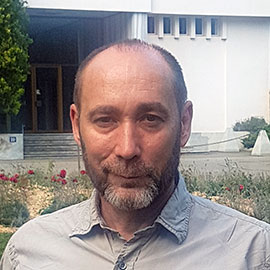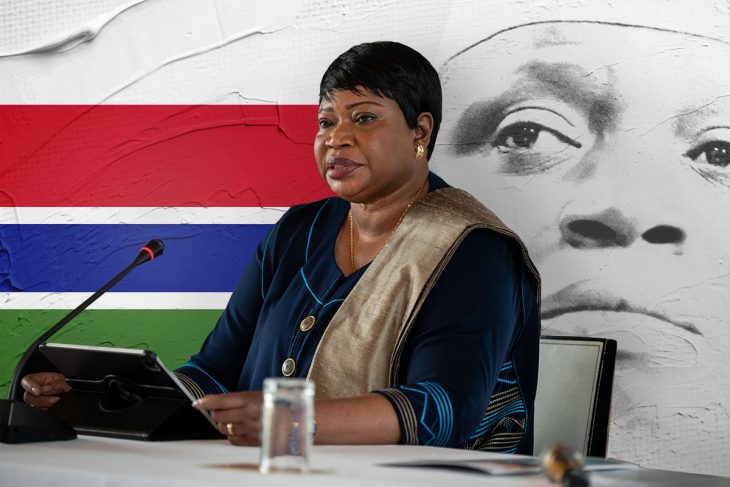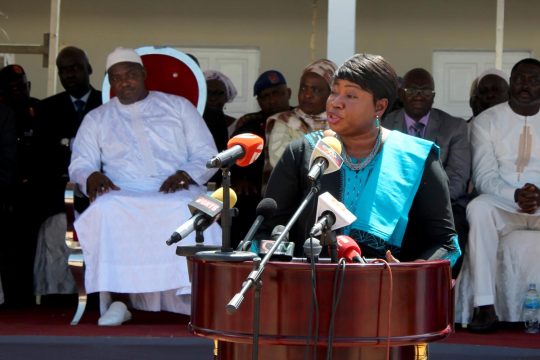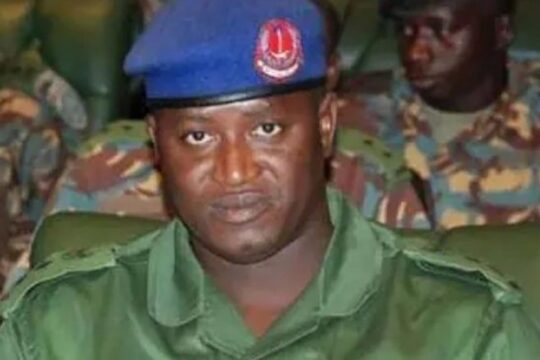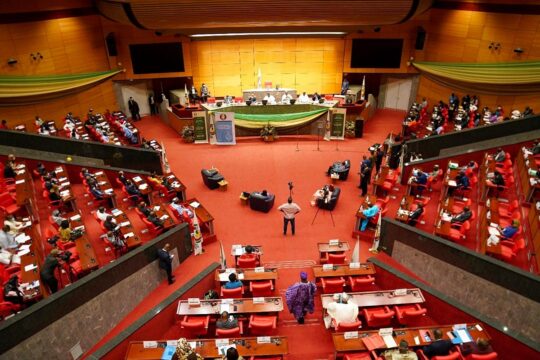JUSTICEINFO.NET: Between the July 1994 military coup and 2000 you served in different senior positions in the Gambian justice system. You were deputy director of public prosecutions, Solicitor General and Legal Secretary, before being the Attorney General and Minister of Justice for two years between 1998 and 2000. What was your experience serving a military regime that turned into a formally non-military dictatorship, led by the same Yahya Jammeh?
FATOU BENSOUDA: First and foremost I want to tell you something that is true to every technocrat who continued to work with the government when the coup d’état came [in July 1994]. This was a time when all of us really thought we needed a change. The thirty-year rule was there and we didn’t seem to have a vision of where we were going. Even though we all respected the then president Sir Dawda [Jawara], he was also surrounded by people who probably did not serve the interests of the country. So, in any given situation like that people want to see a change.
Just to clear the record, when the coup d’état came I was already the deputy director of public prosecutions. I was the first occupant of that position. Of course [Jammeh’s coup] came as a surprise. But eventually we realized that this had really come to stay and we started to look at the positive side of it, that now there was a change. The rhetoric that the new government had was about transparency, accountability, using technocrats to be leading these ministries and not just politicians. We were happy with that and many of us decided to stay. And we worked.
And was there a moment when the feeling changed, where you thought that it was not going exactly how you hoped it would?
I must say it changed, perhaps rather quickly. One of the first things the government wanted to do was to create these commissions of inquiry [into the previous regime’s alleged bad governance]. And in my desire to serve my country I was amongst the only Gambians who agreed to serve in the commissions of inquiry. I served in the commission that was dealing with parastatals. I was the leading counsel; the other leading counsels were from Ghana and other places.
Gambia is a small place, we know each other. It was a very difficult time for me to face people I grew up with and knew. What I decided to do was just to do my work with the aim of coming out with results. In fact, in that commission Mr. Faal was my deputy. [Essa Faal has been the Lead Counsel of Gambia’s Truth, Reconciliation and Reparations Commission (TRRC) from late 2018 to September 2021 and is now a presidential candidate.]
And was there a moment where you thought something wrong was happening?
Yes. I have to say that after a little while I discovered that there were attempts to remove me or recommend that I be removed. I learned later on that some people thought I was not making any benefits from the commission.
You mean financial benefits?
Financial. I was not asking for money, I was not being corrupted, so they actually fabricated stories to remove me from the commission. This is when I knew things were different.
When you serve the government, you expect that after serving in a particular position for a few years you will be promoted to the next one."
But eventually you kept being promoted.
That is also something you are taking out of context. When you serve the government, you expect that after serving in a particular position for a few years you will be promoted to the next one.
Yes, but under Jammeh your career moved up pretty fast and you kept holding more senior positions that were as close as it gets to the political power.
Again, I have to explain the context. It’s not that I was stagnant and that when Jammeh came I shot up. I was public prosecutor, then state counsel, then senior state counsel, then principal state counsel, then deputy director of public prosecutions. Then the coup happened. After the coup I occupied two more positions: Solicitor General and Attorney General.
And these are arguably the highest positions in the Ministry of Justice.
People who were under me had been promoted above me to Solicitor General and then to Attorney General, you have to take that. By the time I was promoted to Solicitor General I was in fact the most senior in line. The only person who was senior to me was the then acting registrar.
Because the others had fled?
No, because they were dismissed from office.
Was there any moment during those years where you were aware that serious human rights violations were committed in the Gambia?
No.
During that entire period, from 1994 to 2000?
Not on the scale that we know. At the time, especially as Solicitor General, I was not looking at criminal cases, that was not my responsibility – it was civil issues. I remember we had some serious cases like when the military dumped rice into the sea because they said it was some third-class rice. We went to court and in the end we had to admit that the government did it.
During the entire period you never heard about torture, disappearances, murders, illegal detentions, people dying in prisons? No. Absolutely not."
But during the entire period you never heard about torture, disappearances, murders, illegal detentions, people dying in prisons?
No. Absolutely not. But was it happening then?
Well, according to the Truth Commission, yes.
This is now that we know, I keep repeating that to you.
At the time, you say that you didn’t know?
No.
Wasn’t there any Amnesty International report?
Not that I am aware of, really.
Human rights organizations were not vocal about it?
I remember that at the time Human Rights Watch once or twice came to the Gambia. And then we went to visit the prisons. That I remember, because I was also concerned. And of course there was overcrowding in the prisons, but this was not new, it was there before Jammeh came. A lot of secrecy was going on and people were not talking.
We heard at the TRRC that other members of the judiciary decided to leave because they thought they could not serve that regime which was violating human rights. Why didn’t you leave?
You have to see where I was at any given time. When I was deputy prosecutor, there was the demonstration in 1995 and people were arrested. I was given the file and I took the matter to court. When I saw I didn’t have evidence to proceed, I went back to my superiors and recommended that this case should go away. And that was done.
As you know, two individuals charged in this 1995 case testified before the TRRC and claimed that they were tortured, beaten up, that they didn’t have access to a lawyer – as it also transpires from media records at the time. The judge at the time acknowledged their suffering and the two victims say you didn’t protect them.
This is wrong. This is completely wrong. This is being done to bring me to disrepute.
You didn’t know about the abuse they suffered? I didn’t know."
What is wrong: that it didn’t happen or that you didn’t know about the abuse they suffered?
I didn’t know. I was not aware. What was I supposed to do? When there are allegations, there is a trial within the trial: it’s a legal process to verify whether what was said is true or not. And we went through that process.
Do you think that what they say happened to them is not the truth?
No, no, absolutely not! With all that we have heard happened, of course I cannot say that. I am not denying it at all. What I am saying is that I was not aware that this happened, I was not in cahoots with those who tortured them.
What about the long detentions, the absence of a lawyer, you didn’t know?
I was not aware. I did this case. There is another case that I did in which I also requested for a no-leave to be entered [i.e. the case should be dropped] because I thought the file was empty. These things cannot be taken out of context today. We cannot use the circumstances of today and apply them to the time it was happening.
I received orders, I was assigned files and I went to court and I did it, like I always do."
Do you understand that the victims perceived it differently?
Well, what I can say for them now is that at the time this was not my only case, this was not my first case, I happened to be the deputy director of public prosecutions, I received orders, I was assigned files and I went to court and I did it, like I always do.
So you followed orders?
I followed the fact that I was requested to go and if at the time it became common knowledge that there was torturing going on, I [would] go back [to my superiors].
In your position as adviser to Jammeh at the time, you never had to advise him against bad laws and policies?
Like what? You have to look at the period. This was a coup d’état and at the time all what Gambians would believe is what we heard from them [the military], because things happened in the barracks. They would say these people attacked us, we fought back and some people died. This was the story.
And you had no reason to question that?
I remember there was one time in the killing of one of the soldiers in which I told the Inspector General of Police and Minister of Interior that you needed to open a file and say exactly what happened with the killing of this man. These were my instructions. At that time I was the Attorney General.
Between 1994 and 2000 I have never seen any person who decided to leave because they did not like what the government was doing."
How do you explain that some of your colleagues decided to leave?
I am not aware of those colleagues in the judiciary who decided to leave. Between 1994 and 2000 I have never seen any person who decided to leave because they did not like what the government was doing. Please go back to the records and show me one person who was not sacked but decided to leave. Nobody left because at the time we were just in limbo.
So when did you become aware of the serious human rights violations committed under Jammeh’s rule?
I became aware when I was at the ICTR [International Criminal Tribunal for Rwanda, a UN court set up in Arusha, Tanzania]. So that was in 2002. Later on I heard about the killing of a journalist, I heard about many other things that were happening, but that was the first time I became aware that this was happening in the Gambia. If people are honest, they will tell you that if these things were done they were very discreet. Very, very discreet.
And what was your reaction when you heard about it?
Of course I lamented the situation. But I was no longer in a position to say or do anything. I was serving another institution and I did not think I needed to be seen as interfering with what was happening in my country.
That’s another question that people ask: why did you never say anything against the regime when everybody knew, by then, that it was a violent regime?
But where was I? I left and went to the ICTR. You need to ask yourself why Jammeh decided to sack me. I was sacked.
Why?
I don’t want to go into that.
Why not?
According to him I was not doing what he wanted me to do.
Which was what?
I don’t want to discuss that now. But this is why. When Jammeh sacked me he didn’t believe I was working in his interests.
Do you understand that people criticize you because you never spoke out against the regime?
You have to take it in context. When would I speak out?
When you were asked, including back in 2016 when you were interviewed on TV by Tim Sebastian and you refused to answer.
Yes, because at the time I felt I had a responsibility to protect my family and those who depend on me. And I did know that at the time we were all very hopeless, in the sense that there was no protection offered to any victim of Yahya Jammeh. I did not want to expose my family.
Is there anything you wish to say today that you never said about this?
What happened is horrible. And I think it’s important to start documenting from when it started.
This was the government in place. If I wanted to continue to serve my people I served in that government. That’s why I stayed."
Do you also feel something personal when you reflect on having served that regime?
Again, I will come back to my own conviction which is that I served my people. This was the government in place. If I wanted to continue to serve my people I served in that government. That’s why I stayed.
I keep saying that if we knew what we know now, all that has been revealed, it would be a different thing.
Essa Faal said he didn’t have to call you to testify before the TRRC because there wasn’t anything against you. He also said: “Everyone of us has contributed. Nobody said anything. And this encouraged the dictator.” Do you agree with this?
Perhaps we should have said more but again, today it is easy to say that. There was a time when this man [Yahya Jammeh] had really instilled fear in everyone. We were running to serve that government because we said: here is a change. This is how we all started. And many of us today, many senior lawyers that are there, served that government. We thought we would make things better. Even when I served as Attorney General, I was one of the only people who would face Yahya Jammeh and tell him the truth. I think in the end he got fed up with that and that’s why he sacked me.
A number of your former colleagues in the judiciary went to testify before the TRRC. Why didn’t you?
First the position I occupied [as Prosecutor of the ICC] was not appropriate for me to go. Secondly I didn’t have anything to say to the commission. I did not. All the accusations and distorted stories that they told [about me], the commission was wronged. Why should I volunteer and say it? They wronged me; I did not wrong them.
Well the victims were wronged too, don’t you agree?
Not by me. When I saw that this case was not to be pursued I recommended it and we stopped this case. That’s what they should have said.
What I see is that there is a group of people who, for one reason or other want to discredit me as prosecutor of the ICC."
But you agree they were victims?
They were victims but not of ICC crimes. What I see is that there is a group of people who, for one reason or other want to discredit me as prosecutor of the ICC, and they have concocted a story and they have tried to make me aware of bad things that were happening and to give a dog a bad name and hang him. And it’s very unfair.
Given all the positions you held at that time, wasn’t it legitimate that people wanted to hear from you?
No, I don’t think so. There were many Ministers of Justice. They were targeting me because of my position as ICC prosecutor.
Do you have any regret from that time?
I will never regret serving my people. Because this is who I am. What I do regret is the fact that perhaps most of us genuinely believed – genuinely believed – that this regime had the interests of the Gambian people at heart, and that this regime was going to take us to a better place. Of course, after some time, we know that this was not the case.
Today how would you qualify the Jammeh regime?
It’s a bad one. It is a bad regime. The first few years, the impression that was given was that they’ve come to save the Gambia. It wasn’t true and you see the bad things that they did kept on getting more serious over the years until it was really bad, in 2014-2016. It had got rotten to the core, I would not deny that. Rotten to the core.

